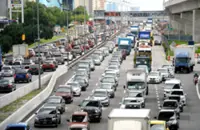PETALING JAYA: The implementation of the targeted subsidy for diesel, which saw the price of the fuel shoot up to RM3.35 per litre from the blanket subsidised price of RM2.15, is expected to pose minimal impact on the sales of diesel vehicles.
The move, however, might speed up the country’s transition to adopting cleaner-fuel vehicles.
TA Research auto sector analyst Angeline Chin said the impact of the rise in diesel prices on vehicle sales would be limited.
“Whether the price goes up or not, you still need diesel vehicles to transport goods. The sales impact will not be significant, especially with some sectors receiving subsidies from the government,” she told StarBiz.
Moreover, she opined the move might accelerate the nation’s push towards electric vehicles (EVs).
Similarly, Carsome group chief business officer Aaron Kee expects the rationalisation of diesel fuel prices to have minimal impact on the sales of diesel vehicles.
Small and medium enterprise (SME) owners, commercial fleet companies and lifestyle users form the primary market for diesel vehicles.
In addition, SME owners may not have the luxury of considering alternatives that meet their business needs.
“This category relies heavily on diesel vehicles for daily activities, which often involve long-distance travel with heavy loads. For them, diesel vehicles are practical due to their durability, longer range, and fuel efficiency,” he said.
Furthermore, if there is a move to rationalise petrol prices, the SME owners may not be incentivised to switch to petrol.
“The current EV charging infrastructure is inadequate to support frequent long-distance travel, making the shift to EVs impractical for this segment for now,” he added.
For commercial fleet users, Kee said they are able to claim cash subsidies based on fleet cards under the government’s subsidised diesel control system.
Furthermore, he noted that some business groups had been paying unsubsidised diesel rates even before the rationalisation was implemented.
Thus, the impact on demand for diesel vehicles from commercial fleet operators is expected to be minimal, as the exercise will not significantly affect their costs or shift dependence away from diesel vehicles.
Having said that, some commercial companies, such as Pos Malaysia Bhd , DHL Malaysia and Lazada Malaysia, had increased the number of EVs in their fleets even before the rationalisation for sustainability reasons.
, DHL Malaysia and Lazada Malaysia, had increased the number of EVs in their fleets even before the rationalisation for sustainability reasons.
“We believe the growth of the sustainability trend is highly dependent on the development of a more robust EV charging infrastructure which is still at a nascent stage. It is our hope that this sustainability trend will continue to grow organically in the long term,” Kee added.
The segment which is most likely to be affected will be the lifestyle users as the rationalisation may reshape their vehicle purchasing decisions, especially if they are not eligible for the Madani Subsidy Assistance Programme or Budi Madani, according to Kee.
The Budi Madani programme offers RM200 in monthly aid for private vehicle owners including farmers and smallholders
“Historically, private car buyers have chosen diesel vehicles due to their superior fuel efficiency and robust engine performance.
“However, rising diesel costs will reduce the savings gap,” he said.
Additionally, the introduction of cutting-edge electric vechicles will present a compelling alternative especially in areas well covered by an EV charging infrastructure.
The government’s move to rationalise diesel subsidy recently was aimed at alleviating the financial burden on the national coffers while ensuring a fairer subsidy distribution besides address smuggling issues.
It is projected to result in savings of RM4bil for the nation, which has been facing a fiscal deficit almost every year since the Asian financial crisis of 1997.
A total of 53,253 passenger vehicles (PVs) were sold in April, an increase of 25% from the 42,587 units sold a year earlier, while sales of commercial vehicles (CVs) fell 9% year-on-year (y-o-y) to 4,738 units from 5,215 units.
The Malaysian Automotive Association (MAA) reported that sales volume for the first four months of this year grew by 8% to 260,236 units from the 240,417 units registered in the corresponding period in 2023.
The total industry volume (TIV) comprised 238,247 PVs (up 11%) and 21,989 CVs (down 15%).
Commenting on the fall in CVs sales year-to-date, Chin said this is a normalisation process “because in the past two years, especially post Covid-19, the auto industry had seen a tremendous pickup in CVs sales.”
Chin said the full-year TIV should be about 700,000 units, up from her previous forecast of 650,000.
This is mainly due to backlog orders.
She, however, added the impact of the fuel subsidy rationalisation might cause some buyers to delay their purchases.





